By Bonnie Barclay, Global Communications Manager for International Rivers
At last month’s UN Water Conference on March 22-24, International Rivers joined Indigenous leaders, civil society partners, and high-level public and private sector stakeholders to discuss key water-related issues and produce ambitious inclusive, and intersectional commitments and approaches that serve all.
About the UN Water Conference
This was the first UN Water Conference in almost 50 years; the last one was in 1977 in Mar de Plata, Argentina. Progress toward addressing the world’s water crisis since then has been extremely inadequate.
Addressing access to clean water is one of the United Nations’ 17 Sustainable Development Goals (SDGs) but water intersects with all of these goals. Water scarcity affects 40% of the world’s population and two billion people live without safely managed drinking water services.
This UN Water Conference was not for new commitments necessarily but rather to ensure prior commitments and actions are inclusive, cross-sectional, and action-oriented for accelerating change to solve the water and sanitation crisis and meet the 2030 SDGs goals. The conference featured five interactive dialogues:
- Water for Health: Access to WASH, including the Human Rights to Safe Drinking Water and Sanitation (SDG 6.1, 6.2, 6.3 and SDGs 1, 3, 4, 5, 17)
- Water for Sustainable Development: Valuing Water, Water-Energy-Food Nexus and Sustainable Economic and Urban Development (SDG 6.3, 6.4, 6.5 and SDGs 2, 8, 9, 11, 12)
- Water for Climate, Resilience and Environment: Source to Sea, Biodiversity, Climate, Resilience and DRR (SDGs 6.5, 6.6, 7, 11.5, 13, 14, 15)
- Water for Cooperation: Transboundary and International Water Cooperation, Cross-Sectoral Cooperation, including Scientific Cooperation, and Water Across the 2030 Agenda (SDG 6.5, 6.b and SDGs 16, 17)
- Water Action Decade: Accelerating the implementation of the objectives of the Decade, including through the UN Secretary-General’s Action Plan
See the UN’s summary of outcomes and the newly launched Water Action Agenda).
Rights are at the center of clean water access
Monti Aguirre, International Rivers’ Latin America Program Director spoke at multiple sessions on the importance of centering Indigenous Peoples’ rights as well as permanent protections for rivers.
The way we value, use, and manage water around the world, needs to radically change and it needs to have rights at the center of approaches if the solutions are to work and challenges are met.
Highlights:
1) Red por los ríos libres en Chile: una experiencia sustentada en el compromiso (Network for free-flowing rivers in Chile: an experience based on commitment)
On March 21st, Monti Aguirre spoke about the protection work for free-flowing Rivers in Chile with partners (Watch the online discussion)
2) Turning the tide on the freshwater biodiversity crisis
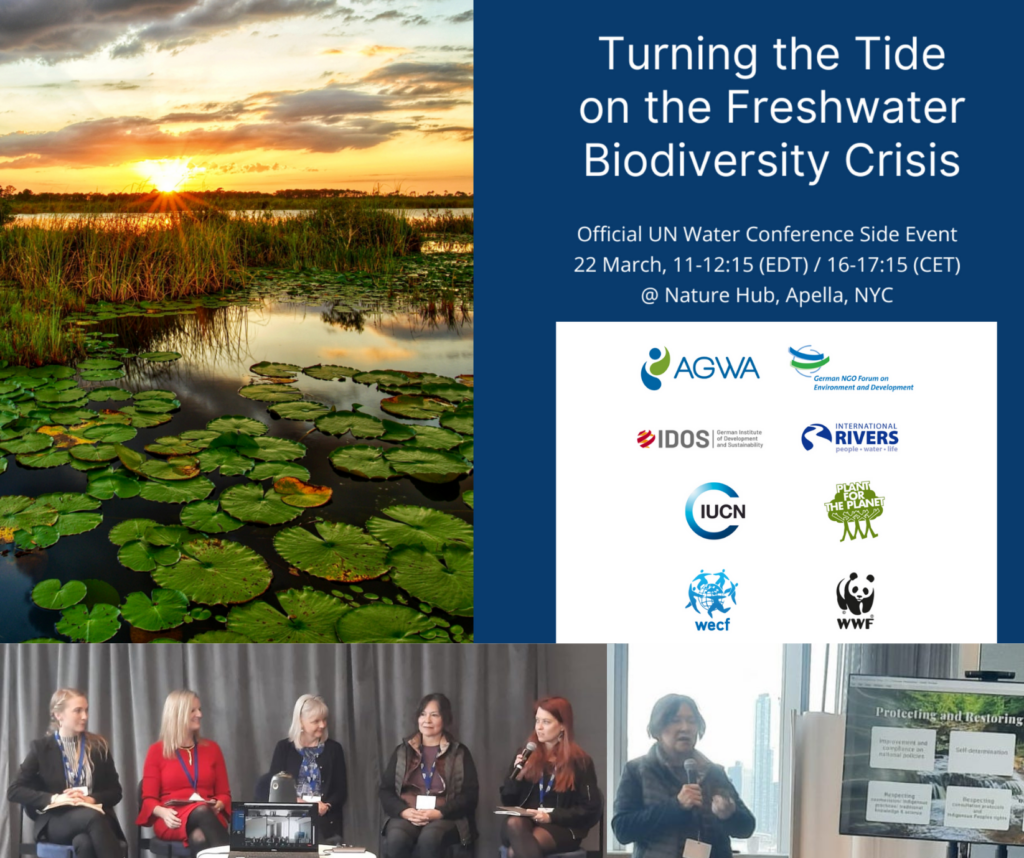
Monti Aguirre spoke on a panel on the importance of Indigenous Peoples’ rights and inclusion in freshwater biodiversity protection in order to catalyze conservation and restoration approaches in freshwater ecosystems.
3) Radical Collaboration for Water Resilience: Action with our greatest Allies in the Climate Crisis
Starting off World Water Day was the official UN Side Event, Radical Collaboration for Water Resilience. This event was moderated by Indigenous Filipino human rights and environment leader Joan Carling of the Indigenous Peoples Major Group for the SDGs and Indigenous Peoples Rights International, and more. The event kicked off with special guest Deb Haaland’s opening message.
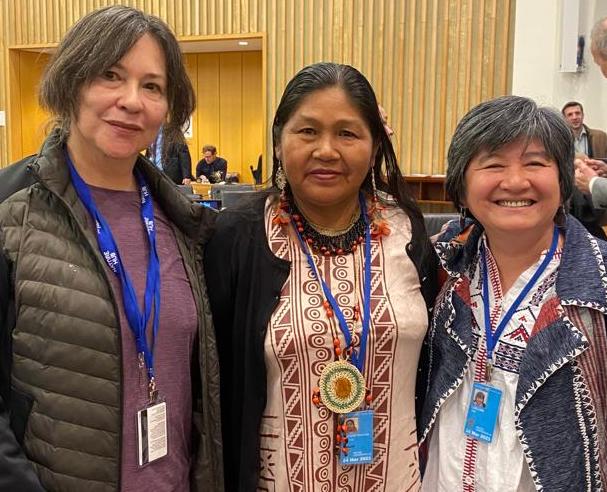
4) Side event: Cooperation and Social Participation for the Water Management
Learn more here.
5) Official event: Reducing inequalities – implementing Human Rights
Aguirre spoke about the harmful impacts dams have on human rights especially the rights of Indigenous Peoples.
Click on the video to watch her speech. Learn more and read her full statement here.
“Any meaningful progress on protecting water, global biodiversity and saving the climate requires that we stand with indigenous communities to protect their land, water, and rights.”
6) Side event: Water for Nature, Nature for Water: Policies, Solutions and Commitments for Sustainable Development
An excellent discussion moderated by Flavio Rocha Loures
7) Facilitating Access to knowledge about Water (Facilitando o acesso do conhecimento sobre a água)
Watch it here
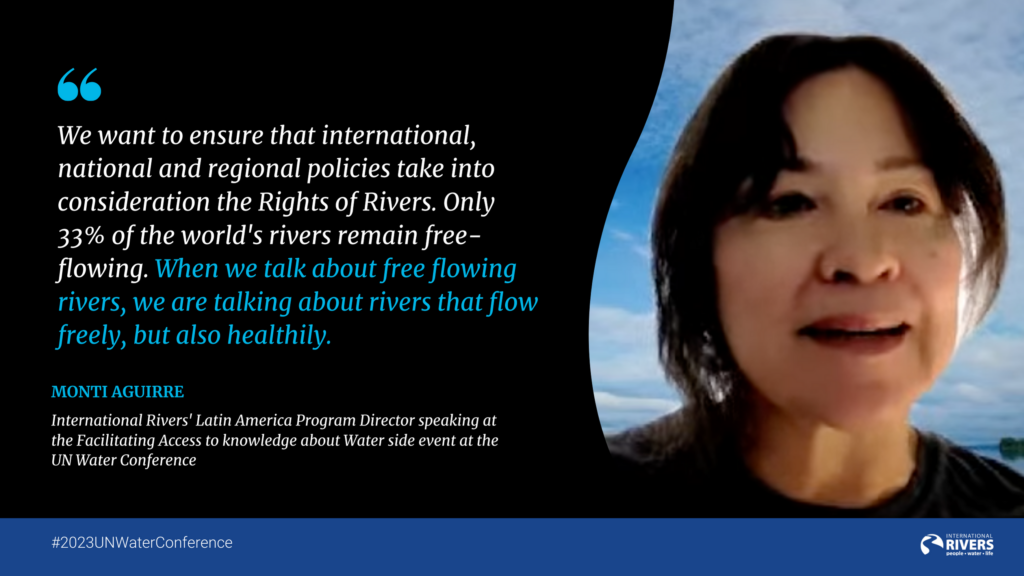
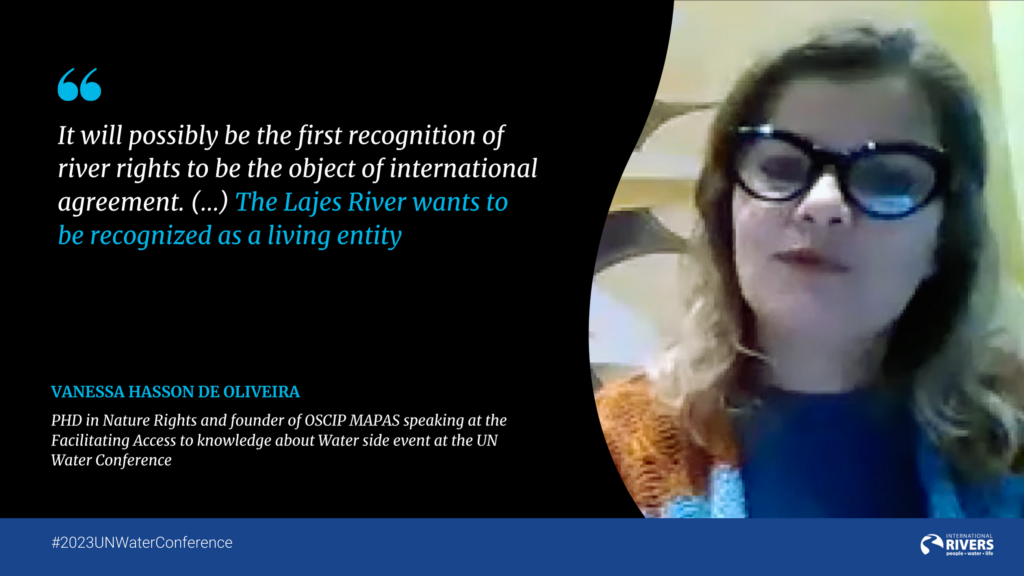
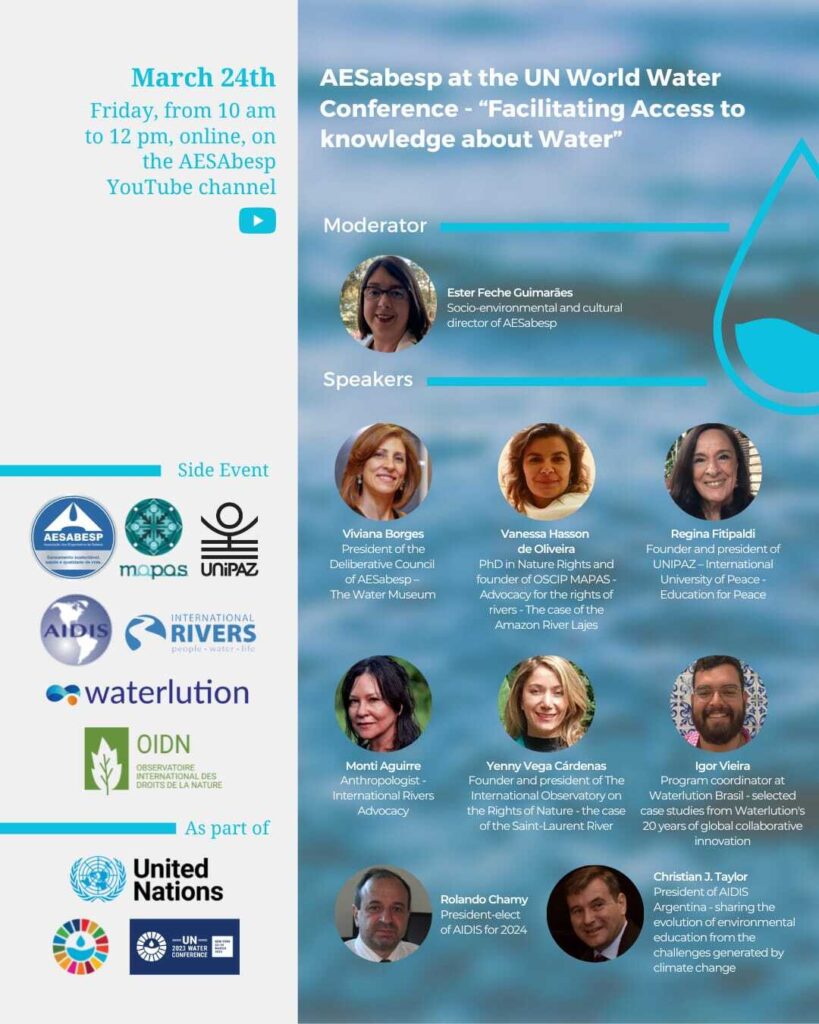
8) Side event: Rights of Nature: The missing connection to enhance and implement the SDGs on Water
Watch here and stay tuned for more from this event.
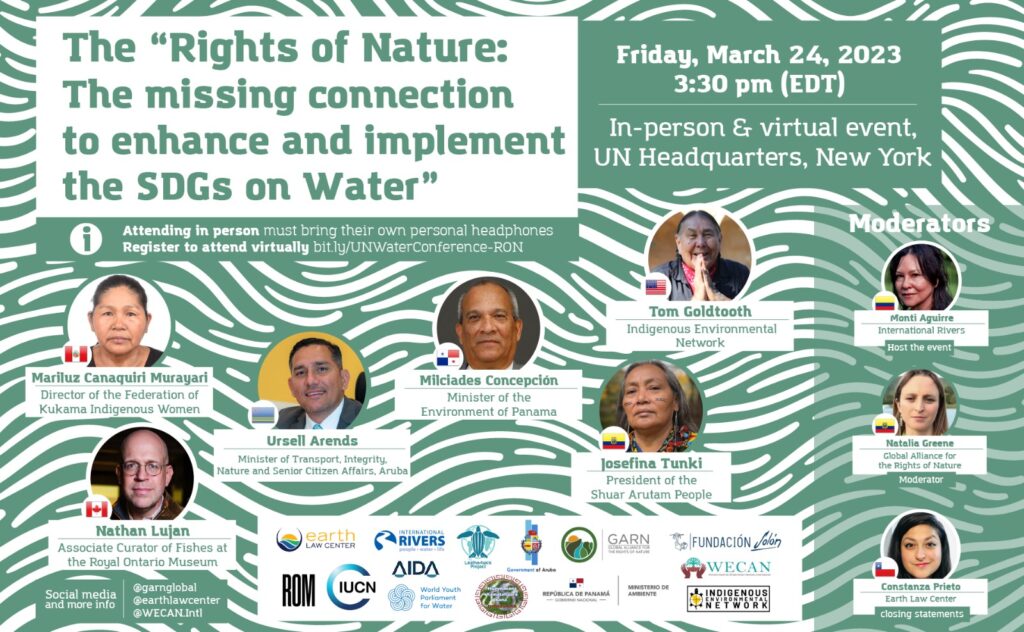
Key publications and recommendations released at the UN Water Conference
International Rivers and partners were involved in multiple coalition water recommendations including:
- On World Water Day (March 22), International Rivers, Friends of the Earth US, and Rivers without Boundaries released our new co-published briefing paper, called, “Protecting biodiversity from harmful financing: Free flowing rivers.” Free-flowing Rivers are critical for safeguarding biodiversity, mitigating climate change and providing a water supply for communities. The paper lays out and calls for financial institutions to stop bankrolling hydropower dams and projects and other harmful water infrastructure projects. Learn more
- Transformative Water Pact (TWP) was developed in response to the continued exploitation of nature, neglect of human rights and the extreme power-imbalances that characterize contemporary water governance throughout the world. It details an alternative vision of water governance based on the tenets of environmental justice, equality and care. The TWP spans two sections of key principles and a framework for action, that provide anchor-points and strategic priorities to guide decision-making for transformative change in water governance. It was initiated by the Dutch environmental justice organization Both ENDS and the international water knowledge institute IHE-Delft. It was developed and authored by a diverse group of 40+ environmental justice advocates from civil society and academia, notably from the Global South, who work extensively on water-related issues throughout the world. Sign the TWP.
- People’s Water Manifesto was developed by the People’s Water Forum and is the coordinating space for Water Justice Movements from around the world. Endorse Water Justice Manifesto // Suscribe el Manifiesto por la Justícia Hídrica
Women River Guardians to watch
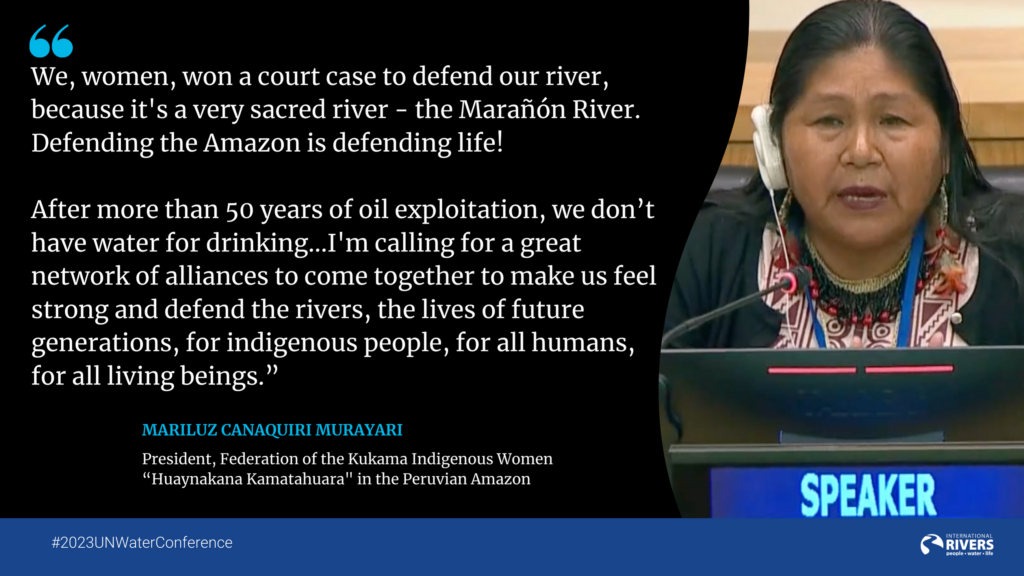
Mariluz Canaquiri Murayari is president of the Federation of Kukama Indigenous Women “Huaynakana Kamatahuara” (working women). For the last 30 years, she has defended her Kukama Kukamiria nation in Peru and worked in defense of the Marañón River basin, the territory of the Kukama nation and home of their ancestors. For 50 years, the Kukama people have been suffering the negative impacts of oil exploitation and other extractive activities, damaging their rivers and forests and everything that lives within them. Today, they lead a fight to recognize the rights of the Marañón River and the Kukama territory and people.
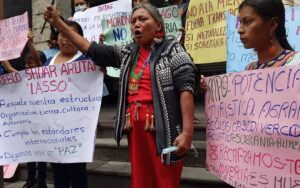
Josefina Tunki is president of the Shuar Arutam People (PSHA) of the Ecuadorian Amazon. Called among her people a ‘brave woman,’ Josefina is the first Shuar female leader, and she firmly stands in defense of the Amazon against extractive activities that consistently violate the rights of Indigenous Peoples and the environment. Since becoming president among her people in 2019, Josefina has lived under constant threat from the mining companies. She is also leading the defense of the Santiago River where a megadam is proposed, which would impact her people and the Wampis Indigenous peoples downstream in Peru.
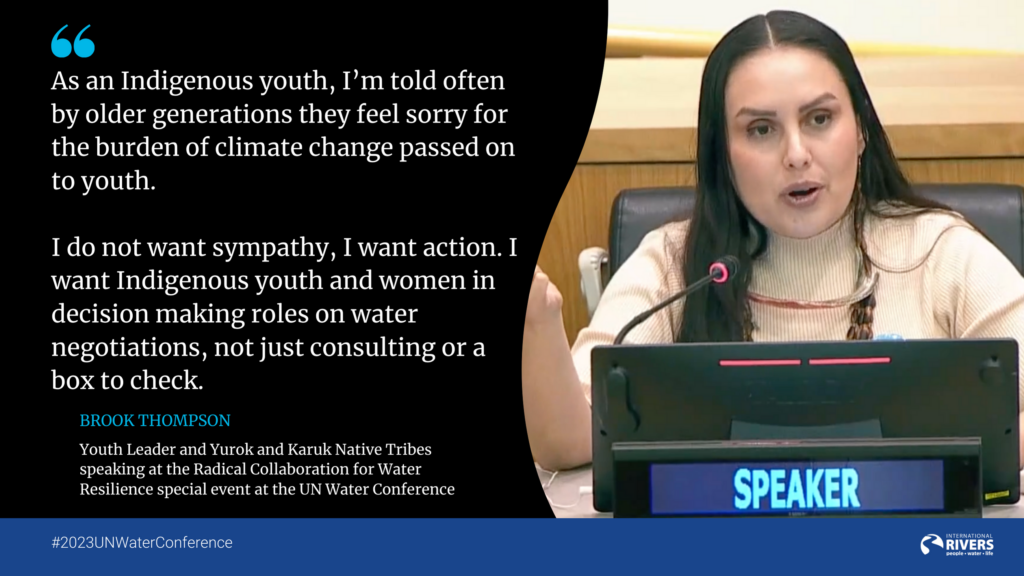
Brook Thompson is a Yurok and Karuk Native tribe member from Northern California. Growing up she lived and fished on the same land that her ancestors have been on since time immemorial. Brook fights for water and Native American rights through public speaking, academic research, and frontline activism. In 2017 Brook was awarded the American Indian Graduate Center’s Undergraduate student of the year and in 2020 she won Unity’s 25 Under 25 award, and in 2022 was accepted into the Water Solution Network. Brook is pursuing her Ph.D. in environmental studies at UC Santa Cruz where she studies how Indigenous Knowledge can be better implemented into California water policy.
Two participants of this year’s Women and Rivers leadership Accelerator Program also attended and spoke at events.
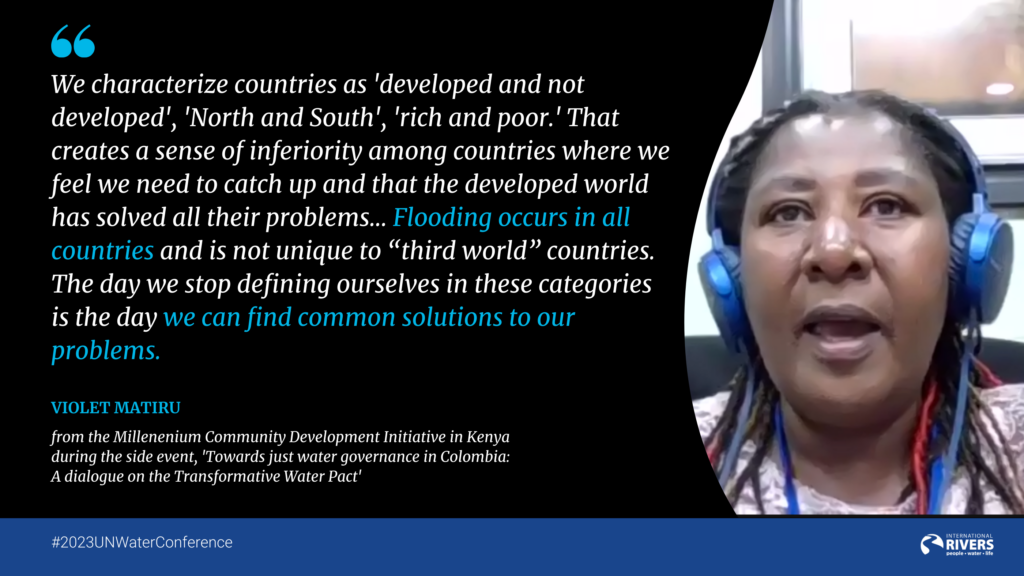
Violet Matiru of Millennium Community Development Initiatives (MCDI) and the Athi River Community Network in Kenya spoke at the UN Water Conference at the Transformative Water Pact event hosted by Both Ends
Ritu Thapa of the Indigenous Women Legal Awareness Group (INWOLAG) from Nepal also joined discussions at the UN Water Conference.
And of course, International Rivers’ very own Latin America Program Director Monti Aguirre, who celebrates her 25th anniversary with International Rivers this year.
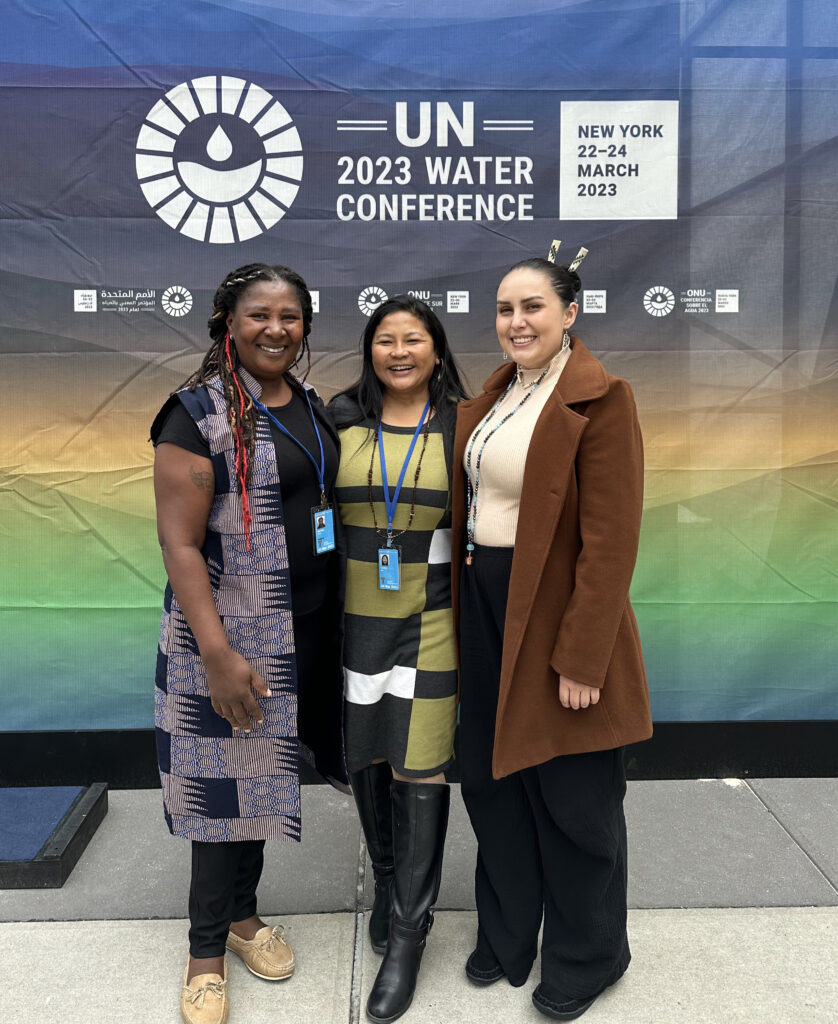
Water Action commitments International Rivers took alongside partners
- Defending the Marañón River led by Federación de Mujeres Indígenas Kukama Kukamiria “Huaynakana Kamatahuara Kana” and in partnership with us, Earth Law Center and others
- Rights of Nature: A Catalyst for the implementation of the Sustainable Development Agenda on Water

